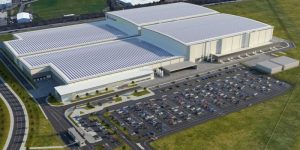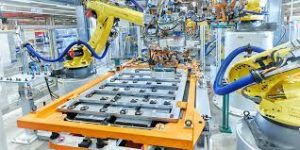Ford Motor temporarily suspended work at its battery plant Monday as it negotiates with striking members of the United Auto

Workers. Ford stated its insecurity about operating competitively amid ongoing tensions with China and expanding their electric vehicle lineup by adding another battery chemistry type.
Ford plans for the project, to be built on land that’s being prepared for industrial development approximately 100 miles west of Detroit, to start production by 2026 and produce 35 gigawatt hours annually – enough power for approximately 400,000 cars each year, according to Ford estimates.
Blue Oval Battery Park Michigan will be the fourth battery manufacturing plant for Ford, having invested $3.5 billion so far. Here, lithium iron phosphate (LFP) batteries for electric vehicles (EVs), free from cobalt and nickel that are difficult and expensive to extract from the earth, will be produced – these lighter LFP batteries should increase range by faster charging rates; Ford anticipates producing batteries for all its EV models such as Mustang Mach E SUV, Focus electric sedan as well as F-150 and Expedition electric pickup trucks.
Ford and its competitors have recently undertaken efforts to bring battery production closer to home, which allows them to reduce costs associated with sourcing raw materials needed for battery production and transporting them from overseas. Furthermore, this makes taking advantage of federal tax credits available to buyers of electric vehicles easier.

Ford announced its plans in February, prompting political backlash due to its links with Chinese battery manufacturer Contemporary Amperex Technology Co. Limited (CATL). Virginia Gov. Glen Youngkin described CATL-Ford’s project as an attempt by Communist China to undermine American national security – sparking national security fears in his state.
Ford executives responded that Marshall would become wholly owned subsidiary and under the control of Ford, with its operations and licensing managed directly by Ford itself. Additionally, no batteries produced at Marshall will be sold outside the U.S. This plant will be one of several where Ford plans to produce electric vehicle batteries at starting salaries between $20-50 an hour.
Politicians such as state Sen. Mike Drake (R-Columbus) remain concerned, believing the battery factory in Marshall could violate a federal EV subsidy law which requires domestic production and raw material sourcing within the U.S. Officials are waiting for guidance from the Department of Energy as to whether this factory would fall foul of requirements set out in an appropriation bill passed last year by Congress ensuring money for EV subsidies does not flow to foreign companies that cannot compete effectively in America’s marketplace. This story originally appeared on MLive